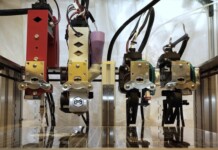A new biomass plant that converts wood or agricultural waste into a combustible gas mixture is offering remote communities access to electricity in an environment friendly, carbon neutral way, thanks to the United Nations Development Program.
The gasifier was fired up yesterday in a remote village of southern India called Boregunte, in Karnataka state.
“The project not only improves their lives but also helps reduce the greenhouse gas emissions,” Mr. Dervis said, adding: “The fact that they manage the project on their own gives them the opportunity to have additional sources of income.”
The plant was funded by the UN’s Global Environment Facility, and supported by the Ministry of Environment and Forests of the Government of India, the Government of Karnataka, and UNDP, the agency said.
It is the second plant commissioned under the project and has the capacity of delivering 250 kilowatts of electricity, with excess power to be sold to the Bangalore Electric Supply Company, according to UNDP.
In the gasifiers, wood or coconut shells are reduced to small pieces and burned in a reactor that converts them to combustible gases, a mixture of carbon monoxide and hydrogen. This so-called ‘producer gas’ runs the engines, which produce power.
The first plant under the project was inaugurated in the village of Kabbigere on 24 January and has provided around 10,000 kilowatt-hours of electricity to four villages since then.
A third plant, producing 250 kilowatt-hours, will be commissioned soon in Seebirayanapalya and another in Chinnenahalli has been proposed to be commissioned by the end of 2008.



















